

DECEMBER • VOL. 12• SERIES OF 2021
INSIGHTS is a monthly publication of BDB LAW to inform, update and provide perspectives to our clients and readers on significant tax-related court decisions and regulatory issuances (includes BIR, SEC, BSP, and various government agencies).

DISCLAIMER: The contents of this Insights are summaries of selected issuances from various government agencies, Court decisions, and articles written by our experts. They are intended for guidance only and as such should not be regarded as a substitute for professional advice.
Copyright © 2021 by Du-Baladad and Associates (BDB Law). All rights reserved. No part of this issue covered by this copyright may be produced and/or used in any form or by any means – graphic, electronic, and mechanical without the written permission of the publisher.
What's Inside ...
- HIGHLIGHTS FOR DECEMBER 2021
- SIGNIFICANT COURT DECISIONS
- Court of Tax Appeals
- SIGNIFICANT REGULATORY ISSUANCES
- Bureau of Internal Revenue
- Securities and Exchange Commission
- Bangko Sentral Ng Pilipinas
- Insurance Commission
- PUBLISHED ARTICLE
- CREATE More VAT Confusion
- OUR EXPERTS
- The Personalities
- The Personalities


HIGHLIGHTS for NOVEMBER 2021
COURT OF TAX APPEALS DECISIONS
- A protest must state the nature thereof – whether it is a request for reconsideration or reinvestigation –to be valid. (HR Mall, Inc. v. Commissioner of Internal Revenue, CTA Case No. 9981, November 12, 2021)
- The equitable principles of in pari delicto and estoppel are the exceptions to the general rule that a waiver, to be valid and effective, must comply with the requisites specified under the existing BIR rules and regulations. (Medicard Philippines, Inc. v. Commissioner of Internal Revenue, CTA EB No. 2158, November 17, 2021)
- A taxpayer claiming for a VAT refund or credit has the burden to prove not only that the recipient of the service is a foreign corporation, but also that said corporation is doing business outside the Philippines. (Amadeus Marketing Philippines, Inc. v. Commissioner of Internal Revenue, CTA Case No. 10094, November 17, 2021)
- The BIR has the duty to apprise the taxpayer of the legal and factual bases of the assessments issued against it, consider the explanations or defenses raised by the taxpayer in connection with the assessments, and the reason for the rejection of such explanations or defenses be communicated to taxpayers. (Bac-Man Geothermal, Inc. v. Commissioner of Internal Revenue, CTA Case No. 9728, November 18, 2021)
- The conviction of the corporation is necessary before the penalty therefor may be imposed upon its corporate officers. (Enviroaire, Inc., et. al. v. People of the Philippines, CTA EB Crim. No. 073, November 25, 2021)
- The taxpayer, after filing a protest embodying a request for investigation, must be given a period of 60 days within which to submit all relevant supporting documents in support thereof, before an FDDA may be issued. (Commissioner of Internal Revenue v. Maxicare Healthcare Corporation, CTA EB No. 2325, November 25, 2021)
- Judicial claim for refund under Section 229 of the Tax Code must be filed within two (2) years from payment of the tax “regardless of any supervening cause that may arise after payment.” (PMFTC, Inc. v. Commissioner of Internal Revenue, CTA Case No. 10110, November 25, 2021)
BIR ISSUANCES
-
RR No. 19-2021, November 9, 2021 – This provides the implementation of the Tax Incentive and Exemption Provisions of RA No. 11321 or the “Sagip Saka Act.”
-
RMC No. 112-2021, November 10, 2021 – ATRIG shall no longer be necessary for the importation of perishable agricultural food products.
-
RMC No. 117-2021, November 24, 2021 – This clarifies the submission of BIR Form Nos. 2307 and 2316.
SEC ISSUANCES
- SEC Memorandum Circular No. 11, Series of 2021, November 11, 2021 – Posting of additional securities deposit for branch offices falling due in 2021 is extended until December 23, 2021.
BSP ISSUANCES
-
BSP Circular No. 1129, Series of 2021, November 12, 2021 – This amended the Corporate Governance Guidelines for BSFIs.
-
BSP Circular No. 1130, Series of 2021, November 23, 2021 – This amended MORB and MORNBFI to include digital banks as eligible participants for BSP’s monetary operations and trust entities eligible participants for BSP Securities in the secondary market.
-
BSP Memorandum No. M-2021-065, November 23, 2021 – This provides temporary regulatory relief for banks that offer basic deposit accounts (BDAs).
IC ISSUANCES
-
IC Circular Letter No. 2021-65, November 5, 2021 – This provides the revised on-site examination/off-site verification rules and procedures.
-
IC Circular Letter No. 2021-66, November 10, 2021 – This amended the guidelines on electronic commerce of insurance products to include Regulation, Enforcement and Prosecution Division for non-life insurance companies and by the Actuarial Division for life insurance companies in items 7.8 and 15.2 of CL No. 2014-47.
-
IC Circular Letter No. 2021-68, November 24, 2021 – This provides guidelines on offering of discounts on membership fees of HMO products.
-
IC Legal Opinion No. 2021-15, November 22, 2021 – There is no outright prohibition for a member of the Board of Director in an insurance company to own or manage an insurance agency, as long as it can secure an authorization through a board resolution.

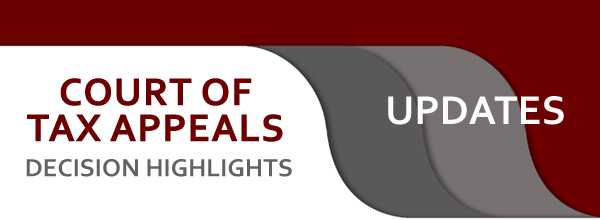
A protest must state the nature thereof – whether it is a request for reconsideration or reinvestigation –to be valid..
A protest to a Final Assessment Notice must state the following: (1) the nature thereof (whether reconsideration or reinvestigation, and in case of the latter, it must specify the newly discovered or additional evidence the taxpayer intends to present); (2) date of the assessment notice; and (3) the applicable law, rules and regulations, or jurisprudence on which the protest is based; otherwise, it shall be considered void, and without force and effect.
Here, while the taxpayer indicated in its Protest letter the date of receipt of the subject FAN and a certain form of legal basis to support some of its arguments against the FAN, nowhere it is stated that the protest is a request for reconsideration or a request for reinvestigation. Nevertheless, even granting that the court is justified to ignore the said requirement, it cannot determine whether the same is a request for reconsideration or a request of reinvestigation, since there is no plea of re-evaluation either "on the basis of existing records without need of additional evidence" or "on the basis of newly discovered or additional evidence that the taxpayer intends to present.” As such, the said letter cannot be considered as a valid protest, and thus, without force and effect. (HR Mall, Inc. v. Commissioner of Internal Revenue, CTA Case No. 9981, November 12, 2021)
The equitable principles of in pari delicto and estoppel are the exceptions to the general rule that a waiver, to be valid and effective, must comply with the requisites specified under the existing BIR rules and regulations.
The Court held that when a waiver does not comply with the requisites for its validity specified under the existing BIR rules and regulations (RMO No. 20-90 and RDAO 05-01), it is invalid and ineffective to extend the prescriptive period to assess taxes. However, there is an exception to this general rule following the equitable principles of in pari delicto and estoppel.
Here, it is apparent that the taxpayer’s VP Controller signed the seven (7) consecutive waivers without presenting any notarized written authority to do so for each of the waivers. The BIR, on the other hand, failed to demand the submission of such notarized written authority for the seven (7) waivers that were executed. This mutual failure on the part of both parties to fulfill their obligations renders them in pari delicto. Thus, the parties cannot be allowed to raise the defects in the waivers to their own benefit. Instead, the validity of the waivers shall be upheld consistent with the public policy embodied in the principle that taxes are the lifeblood of the government.
Thus, the Court found that the waivers are valid by reason of the mutual fault of the parties. (Medicard Philippines, Inc. v. Commissioner of Internal Revenue, CTA EB No. 2158, November 17, 2021)
A taxpayer claiming for a VAT refund or credit has the burden to prove not only that the recipient of the service is a foreign corporation, but also that said corporation is doing business outside the Philippines.
The taxpayer contended, among others, that it is engaged in zero-rated and effectively zero-rated sales, that it complied with the qualifying conditions for zero-rating, and that the recipient of its services, its parent, Amadeus Spain, is doing business outside the Philippines. Conversely, the BIR countered that the taxpayer’s claim for refund or issuance of tax credit certificate must be denied because it failed to prove that it is engaged in zero-rated or effectively zero-rated sales of services and the recipient of the taxpayer’s services is actively doing business in the Philippines.
The Court held that when a judicial claim for refund or tax credit is appealed from an unsuccessful administrative claim, the taxpayer has to convince the Court that the BIR had no reason to deny its claim. It becomes imperative for the taxpayer to show the Court that not only is it entitled under substantive law to its claim, but also that it satisfied all the evidentiary requirements for its administrative claim. Thus, it is crucial for a taxpayer in a judicial claim for refund or tax credit to show that its administrative claim should have been granted in the first place. Further, a taxpayer claiming for a VAT refund or credit has the burden to prove not only that the recipient of the service is a foreign corporation, but also that said corporation is doing business outside the Philippines.
Here, the BIR denied the taxpayer’s administrative claim on the ground that the latter’s sale of services to its parent Amadeus Spain cannot be considered as zero-rated sales since Amadeus Spain is doing business in the Philippines. However, the taxpayer failed to show that the BIR was in error
in finding that Amadeus Spain is doing business in the Philippines. Thus, the taxpayer has failed to overcome the BIR’s finding and basis for denying its administrative claim. (Amadeus Marketing Philippines, Inc. v. Commissioner of Internal Revenue, CTA Case No. 10094, November 17, 2021)
The BIR has the duty to apprise the taxpayer of the legal and factual bases of the assessments issued against it, consider the explanations or defenses raised by the taxpayer in connection with the assessments, and the reason for the rejection of such explanations or defenses be communicated to taxpayers.
The taxpayer asserted that the BIR failed to comply with the standards of due process, specifically: (i) the PAN and FLD did not provide adequate factual basis of the assessment; (ii) the FLD failed to consider and address the taxpayer’s explanation in the Reply to the PAN; and (iii) the FDDA failed to state the legal and factual bases of the assessment.
In granting the Petition, the Court held that the law mandates that the legal and factual bases be reflected in the preliminary assessment notice, formal letter of demand, final assessment notice and final decision on the disputed assessment. It stressed the significance of the BIR’s duty to apprise the taxpayer of the legal and factual bases of the assessments issued against it, to consider the explanations or defenses raised by the taxpayer in connection with the assessments, and that the reason for the rejection of such explanations or defenses be communicated to taxpayers. Failure to do so would render the Final Letter of Demand and Final Assessment Notices null and void.
Here, the FLD is a verbatim reproduction of the wordings of the PAN, differing only in the computation of the interest. The FLD also neither referred to the taxpayer’s Reply nor addressed its arguments therein. Worse, the FLD was not even accompanied with a computation sheet. Further, the FDDA miserably failed to address the taxpayer’s arguments raised therein and merely repeated the contents of the PAN and FLD. Thus, the same are void and without any legal significance for the BIR’s wanton disregard of the due process requirements. (Bac-Man Geothermal, Inc. v. Commissioner of Internal Revenue, CTA Case No. 9728, November 18, 2021)
The conviction of the corporation is necessary before the penalty therefor may be imposed upon its corporate officers.
This is a Petition for review filed by Petitioners Ong and Chua praying for the reversal of Decision of the CTA Division finding them guilty beyond reasonable doubt of violating Section 254, in relation to Sections 253 and 256, of the Tax Code. They contended that Enviroaire was not charged as an accused in the Amended Information. As such, they argued that the Court Division is bereft of jurisdiction over the person of the Company. In turn, they explained that since petitioners Ong and Chua's conviction is dependent on the guilt of Enviroaire, the findings of the Court Division against them are improper and invalid.
In finding for Petitioners, the Court held that there is no penal law that directly charges the corporate officers for willful attempt to evade and defeat corporate income tax. The imposition of the penalty upon a corporate officer without first convicting the corporation, itself, is void and must be struck down. This is so because without a convicted corporation, there is no erring responsible officer. The crime of willfully attempting to evade or defeat tax may only be committed by the person obligated under the law to declare and pay tax, which is the corporation. Therefore, to punish the officers without establishing the guilt of the juridical entity runs against the basic tenets of due process and the rule of "nullum crimen, nulla poena sine lege," or that there can exist no punishable act except those previously and specifically provided for by penal statute, regardless of how reprehensible the act is.
Here, Enviroaire was neither charged in the Amended Information nor the subject of an arraignment, through its responsible officers. As such, it cannot be considered an accused herein, much less convicted and ordered to pay the fine. Since only petitioners Ong and Chua were indicted/charged for willful attempt to evade or defeat taxes in the Amended Information, the charges against them must be struck down as their conviction has no leg to stand on. (Enviroaire, Inc., et. al. v. People of the Philippines, CTA EB Crim. No. 073, November 25, 2021)
The taxpayer, after filing a protest embodying a request for investigation, must be given a period of 60 days within which to submit all relevant supporting documents in support thereof, before an FDDA may be issued.
The BIR asserted that the taxpayer’s protest to the FLD/FAN was a request for reconsideration, not a request for reinvestigation, for which the 60-day period does not apply.
In ruling against the BIR, the Court held that part of the due process requirement to be observed in the issuance of a deficiency tax assessment is that the taxpayer, after filing a protest embodying a request for investigation, must be given a period of 60 days within which to submit all relevant supporting documents in support thereof, before an FDDA may be issued.
Here, the records show that the taxpayer indicated in its protest to the FLD/FAN that it would furnish the BIR with supporting documents. Thus, the BIR’s issuance of the FDDA before the lapse of the 60-day period or mere 30 days after the filing of the protest to the FLD/FAN essentially precluded the taxpayer from its right to submit supporting documents in support of its protest. By failing to wait for the submission of the supporting documents to the protest to the FLD /FAN, the BIR unduly deprived the taxpayer of a real opportunity to be heard, and thereby, failed to satisfy the due process requirement under the law. The FDDA was issued having been based only on a partially completed protest and without an examination of the taxpayer’s relevant supporting documents. (Commissioner of Internal Revenue v. Maxicare Healthcare Corporation, CTA EB No. 2325, November 25, 2021)
Judicial claim for refund under Section 229 of the Tax Code must be filed within two (2) years from payment of the tax “regardless of any supervening cause that may arise after payment.”
The taxpayer argued that the special circumstance which warrants the suspension of the two (2)-year prescriptive period to file judicial claim for refund of overpayment of excise taxes is the Temporary Restraining Order (TRO) issued by the Supreme Court. Accordingly, in deference to the said TRO, it continuously paid under protest the excise taxes allegedly due to the government under the subject revenue issuances, pending the appeal filed by the Secretary of Finance.
The Court held that the suit or proceeding contemplated to be filed within the two (2)-year prescriptive period under Section 229 of the Tax Code covers any tax, penalty or sum, which has been paid “under protest or duress.” Thus, even when the taxpayer paid the pertinent excise taxes under protest, and notwithstanding the issuance of the said TRO by the Supreme Court, the refund thereof is still within the purview of Section 229, and it does not excuse the taxpayer from complying with the two (2)-year prescriptive period. Furthermore, there can be no merit in the taxpayer’s stance that there is futility of filing a claim for refund while the same TRO was in effect, and in the contention to the effect that the taxpayer was legally and practically prevented from filing a claim for refund or credit on its supposed overpaid excise tax.
In this case, the TRO issued by the Supreme Court is not directed against the herein taxpayer, but only to Philippine Tobacco Institute, Inc. (PTI), the RTC (Branch 253, Las Pinas City), and their representatives. Thus, since the taxpayer is not one to whom the TRO is directed, the same would have no binding effect on it. Moreover, the fact that the taxpayer is a member of PTI does not automatically mean that it is one of the latter's representatives. Even granting that the taxpayer may be deemed as one of the representatives of PTI, the said TRO does enjoin the taxpayer at all, and there is no law which proscribes the taxpayer from complying with the provisions of Section 229 of the Tax Code, particularly, on the successive filing of its administrative and judicial claims, within the two (2)-year prescriptive period thereunder. (PMFTC, Inc. v. Commissioner of Internal Revenue, CTA Case No. 10110, November 25, 2021)

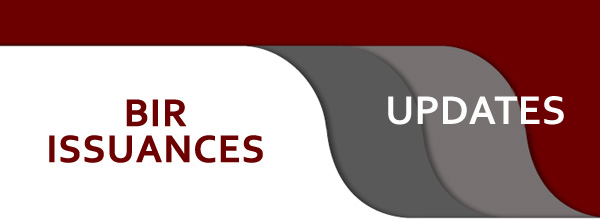
RR No. 19-2021, November 9, 2021.
This provides the implementation of the Tax Incentive and Exemption Provisions of RA No. 11321 or the “Sagip Saka Act.”
• Income Tax Exemption – For cooperative and enterprise to avail income tax exemption under the Sagip Saka Act, the following criteria must be present:
1. The accredited business entity or enterprise must be among the intended beneficiaries enumerated under Section 5 of the IRR of RA No. 11321; and
2. They must have a total asset of not more than P3 million pesos (subject to revision of the appropriate government agency or council), inclusive of those arising from loans but exclusive of land on which the particular business entity’s office, plant and equipment is situated.
• Donor’s Tax Exemption – Donation of real and personal properties to accredited farmers and fisherfolks enterprise shall be exempt from donor’s tax subject to the following conditions:
1. The donee is an accredited farmers and fisherfolk enterprise as certified by the Department of Agriculture;
2. The done is among the proponent groups or beneficiaries of “The Farmers and Fisherfolk Enterprise Development Program” (“FFEDP”), as certified by the Department of Agriculture – Regional Sagip Saka-Program Management Committee (SS-PMC);
3. The donation is made for the accomplishment of the FFEDP, consistent with its objectives to develop enterprises for farmers and fisherfolk towards a sustainable modern agriculture and food security.
4. Request for ruling shall comply with the guidelines under RMO No. 9-2014 and shall be filed with the Law and Legislative Division, Room 709, 7th Floor of the BIR National Office, together with the original/CTC of the following requirements:
a. Certification from the Department of Agriculture that the donee is an accredited farmer and fisherfolk enterprise;
b. Certification from the Department of Agriculture SS-PMC that the donee is among the proponent groups or beneficiaries of FFEDP;
c. TIN;
d. Duly notarized Deed of Donation; and
e. Title and tax declaration if the donation consists of real property and/or proof of receipt of donation of personal property.
Donation made may be deductible from gross income of donor upon compliance of the ordinary rules of deductibility under Section 34 (H) of the Tax Code.
RMC No. 112-2021, November 10, 2021.
Consistent with RA No. 11032 or the “Ease of Doing Business Act of 2018,” the issuance of ATRIG shall no longer be necessary for the importation of perishable agricultural food products, such as unprocessed vegetable, fruits and nuts which are exempt from VAT pursuant to Section 109(1)(A) of the Tax Code, as amended.
RMC No. 117-2021, November 24, 2021.
The provisions of RR No. 16-2021 did not discontinue the submission of BIR Form Nos. 2307 and 2316 in DVD-R but instead offered to all concerned taxpayers’ other modes or submission facilities of the BIR that are available currently, such as electronic AFS System. For BIR Form No. 2316, RMC No. 24-2019 has been issued to require the use of USB memory stick or other similar storage devices in the absence of DVD-Rs.
The USB memory or other similar storage devices may be used for submission of BIR Form No. 2307. These devices, modes and facilities may be availed of for the submission of Certificate of Income Payment Not Subject to Withholding Tax (Excluding Compensation Income) and Certificate of Final Tax Withheld at Source (BIR Form No. 2304 and 2306, respectively).
The file format, naming conventions and other requirements of revenue issuances governing the selected mode of facility shall be strictly complied with. Hence, if the DVD-R or the USB shall be used, the requirements of RR No. 2-2015 shall be complied with. In case of eAFS System, the provisions of RMC Nos. 49-2020, 82-2020 and 44-2021 shall be observed.
Taxpayers are prohibited to use multiple modes/facilities in one given period of submission. Only one mode or facility shall be used in the submission of both Certificates.

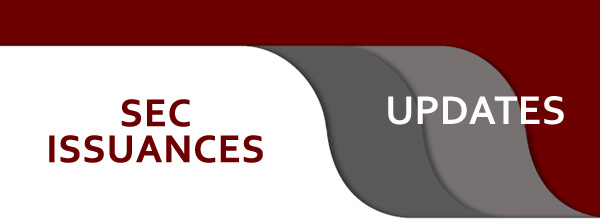
SEC Memorandum Circular No. 11,
Series of 2021, November 11, 2021.
To align with the extended deadline of the AFS, the deadline for the posting of additional securities deposit and substitution of securities deposit of branch offices with fiscal period ending on December 31, 2020 is extended. Posting of additional securities deposit for branch offices falling due in 2021 is extended until December 23, 2021. The extension is automatically applied without the need for a request from the affected branch offices.

BSP Circular No. 1129, Series of 2021, November 12, 2021.
This amended the Corporate Governance Guidelines for BSP-Supervised Financial Institutions (BSFIs).
The following provisions of the Manual of Regulations for Banks (MORB) and Manual of Regulations for Non-Bank Financial Institutions (MORNBFI) are amended:
1. Section 131 – Policy Statement and Definition of Terms – included definitions of:
• NBFIs;
• Quasi-banks (QBs); and
• Substantial stockholder.
2. Sections 132 and 132-Q – Board of Directors
• Composition of the Board of Director – include provision that:
-
-
-
- Non-Filipino citizens may become members of the Board of Directors of a BSFI to the extent of the foreign participation in the equity of said BSFI.
-
-
• Qualifications of the Chairperson and Board of Directors – includes provision on the following:
-
-
-
- Minimum qualifications of a director and persons exempted from complying with the said requirement; and
- Term of office of an independent director.
-
-
3. Sections 134 and 135-Q – Officers
• Provides for the qualifications of officers.
4. Sections 137 and 136-Q – Confirmation of the Election/Appointment of Directors/Officers
• Interlocking Directorship and/or Officerships.
5. Sections 161 and 161-Q – Compliance Framework
• The responsibilities of the Board of Directors and senior management.
6. Sections 346 of MORB – Procedural and Reportorial Requirements
• Deleted periodic submission of regulatory reports on financial assistance to officers and employees.
7. Sections 135 of MORB – Remuneration and Other Incentives
• Included timeline for the submission of board-approved purpose on financial assistance to officers and employees.
8. Sections 374 of MORB and Appendix Q-58 of the MORNBFI– Required Certifications and Examples of Supporting Documents for the Confirmation and Election/Appointment of Directors/Officers of BSFIs
9. Appendix 7 of the MORB– Reports Required of Banks
• Deleted the following reports:
| Category | Form No. | MOR Ref. | Report Title |
| B | DCB I/II Form 6C (BSP 7-16-20) | Availments of Financial Assistance to Officers and Employees Under an Approved Plan | |
| A-3 | TB Form 9 Page 2 | Section 346 | Availments of Financial Assistance to Officers and Employees Under Bangko Sentral Approved Plan |
| B | RB/COB Form 13 | Section 346 | Report on Availment of Financial Assistance to Officers and Employees Under an Approved Plan |
BSP Circular No. 1130, Series of 2021, November 23, 2021.
This amended MORB and MORNBFI to include digital banks as eligible participants for BSP’s monetary operations and trust entities eligible participants for BSP Securities in the secondary market.
BSP Memorandum No. M-2021-065, November 23, 2021.
This provides the following temporary regulatory relief for banks that offer basic deposit accounts (BDAs):
1. Non-presentation of identification cards for BDA for the year 2022 subject to certain conditions;
2. Waiver of the BSP fees to the application of Advanced EFPS for the year 2022 for banks which intend to use the said service to support the offering of BDA; and
3. Reduction in the annual supervisory fees of banks for the years 2022 and 2023 by reducing the bank’s average assessable assets by the average amount of BDA maintained by the bank in the preceding years.

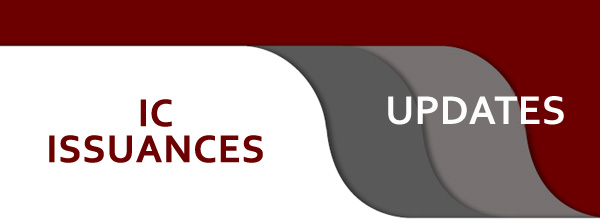
IC Circular Letter No. 2021-65, November 5, 2021.
This provides the revised on-site examination/off-site verification rules and procedures.
1. All insurance and/or reinsurance brokers with valid Certificate of Authority from the IC shall, at all times, comply with the following:
a. Net Worth Requirement;
b. Surety Bond and Errors and Omissions policy;
c. Keeping separate Clients’ Money;
d. Fiduciary Ratio Requirement; and
e. Keeping proper books of accounts.
2. At a minimum, all licensed insurance and/or reinsurance brokers shall submit the following on or before May 31 after the close of the calendar year:
a. AFS;
b. Schedule of Clients' Money Accounts;
c. Schedule of Premium-related Accounts and its reconciliation;
d. Schedule of Fiduciary Computation; and
e. Other requirements deemed necessary by the IC.
3. The lC shall conduct regular off-site verification or monitoring. On-site examination, on the other hand, shall be conducted at least once every five (5) years, and as deemed necessary, based on the previous risk ranking of the company. On-site examination and off-site verification include supervisory reporting, review, and analysis of conduct of business (such as but not limited to complaints, arrangements with (re)insurance companies and brokers and disclosure of information).
4. The IC will use a system of ranking or classification codes to identify the status and perceived riskiness of all insurance and/or reinsurance brokers, as follows:
| Ranking/ Classification Code | Description |
| 1 | Minimal/No Concerns |
| 2 | Some Concerns |
| 3 | Significant Concerns |
| 4 | Highest Priority (Non-compliance with requirements) |
IC Circular Letter No. 2021-66,
November 10, 2021.
This amended the guidelines on electronic commerce of insurance products to include Regulation, Enforcement and Prosecution Division for non-life insurance companies and by the Actuarial Division for life insurance companies in items 7.8 and 15.2 of CL No. 2014-47.
IC Circular Letter No. 2021-68,
November 24, 2021.
This provides the following guidelines on offering of discounts on membership fees of HMO products:
HMOs shall be prohibited from conducting any of the following activities when distributing or offering their HMO products:
1. Giving or offering any type of discount of preferential rate, except:
a. volume discount for HMO products intended for group or corporate accounts; and
b. employee discount, as part of employee benefits, exclusively for employees and their dependents of companies in which the HMO has equity or ownership.
2. Directly or indirectly giving or offering to give any valuable consideration which is not specified in the HMO agreement;
3. Discriminating against any Filipino because of their race.
IC Legal Opinion No. 2021-15,
November 22, 2021.
There is no outright prohibition for a member of the Board of Director in an insurance company to own or manage an insurance agency, as long as it can secure an authorization through a board resolution.

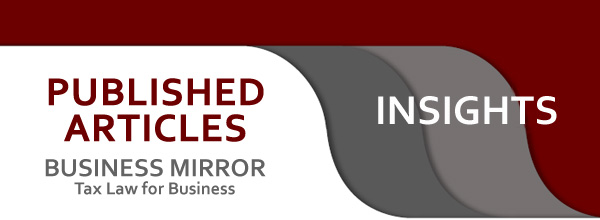
CREATE MORE VAT CONFUSION
By Atty. Irwin C. Nidea Jr.
The quest for a definite answer to the question - what is the proper VAT treatment of a sale to a registered business enterprise (RBE) inside the ecozone? - is a continuing saga. The first chapter started when Revenue Regulation (RR) 9-2021 was released.
RR 9-2021 was issued to implement the imposition of 12% VAT on certain transactions previously taxed at zero rate under the Tax Code. After a few days, the Implementing Rules and Regulations (IRR) of CREATE Law was issued. I flagged in my previous article, that the IRR of CREATE added a provision acknowledging RR 9-2021 and the VAT burden it carries. These additional provisions in the implementing rules of CREATE is considered as unauthorized administrative legislation for they cannot be found in the law. It altered the application of VAT zero-rating, and it added restrictions to the incentives, that are not contemplated by the legislature. CREATE’s only condition is that sale to an ecozone entity must be directly and exclusively used for its registered activities to be considered VAT zero-rated. It does not contemplate the scenario laid down in RR 9-2021, where VAT will be passed on to RBEs.
This regulation was passionately opposed by ecozone locators. You cannot blame them because if RR 9-2021 is carried, VAT will be passed on to RBEs and the cross-border doctrine will be compromised. Thus, the government was forced to issue a circular deferring the implementation of RR 9-2021. Please note that it was not cancelled nor repealed by a subsequent issuance. It was just deferred.
In the meantime, RBEs and their suppliers are in suspended animation since the deferral of RR 9-2021. These businesses are going concerns. After the deferral of RR 9-2021, they are now in an unenviable position where they have to choose between two opposing schools of thought. The first school of thought asserts that the deferral of RR 9-2021 means that the status quo stands. All purchases of an RBE are considered zero-rated and the principle of cross-border doctrine remains untainted. The second school of thought on the other hand, warns that the CREATE law is already in effect and is now part of our Tax Code. It categorically states that only sale to ecozone entities that are directly and exclusively used for its registered activities are considered VAT zero-rated. It has somewhat tweaked and limited the cross-border doctrine.
Both positions carry with them compliance risks. If you follow the first school of thought and the BIR examiner does not agree, an RBE will be assessed with deficiency VAT. The BIR will argue that you should prove that your purchases are directly and exclusively used for your registered activities before you can avail of VAT zero-rating. If you follow the second school of thought on the other hand, the BIR examiner might ask suppliers of ecozone entities why are they not treating all purchases as zero-rated? RBEs might file a claim for refund against their suppliers for imposing VAT.
This is a continuing saga and we are now opening the next chapter. An amendment to the IRR of CREATE was recently issued. The new IRR now reads that all registered EXPORT AND DOMESTIC MARKET ENTERPRISES may continue to enjoy the duty exemption, VAT EXEMPTION ON IMPORTATION, AND VAT ZERO-RATING ON LOCAL PURCHASES provided the DUTY EXEMPTION, VAT exemption on importation and VAT zero-rating on local purchases shall only apply to goods and services directly ATTRIBUTABLE TO and exclusively used in the registered project or activity of SAID REGISTERED export enterprises LOCATED INSIDE THE ECOZONES AND FREEPORTS UNTIL THE EXPIRATION OF THE TRANSITORY PERIOD.
This is now the prevailing rule. To be considered VAT zero-rated, purchases by an ecozone entity must be directly attributable to and exclusively used in its registered project or activity. Suppliers and buyers must determine if what is being bought or sold will be directly attributable to and exclusively used for the registered activity of the ecozone entity.
There is a glaring attempt to abandon the phrase “directly and exclusively used” as worded in CREATE and in the old IRR. Why did they insert the term “attributable” in this new IRR?
As I discussed in my previous article, the Tax Code speaks of attribution. The Court of Tax Appeals (CTA) in the case of Toledo states that "directly" and "entirely" as stated in Section 112 of the Tax Code does not mean that only those purchases of goods that form part of the finished product of the taxpayer can be subject of an input VAT refund.
According to the CTA, it is significant to note that (in claims for refund) the Tax Code did not limit input taxes to those purchases that only form part of the finished product of the taxpayer. To the extent possible, words must be given their ordinary meaning. The word "attribute", the adjective form of which is "attributable", is defined in the dictionary as "to explain as to cause or origin". In other words, "creditable input tax due or paid attributable to such sales" simply means that the input tax is connected with the zero rated or effectively zero-rated sales.
By inserting the word “attributable”, sale to RBEs that may qualify for VAT zero-rating significantly widens. Unlike the phrase “directly and exclusively used” which is limiting, the phrase “directly attributable to and exclusively used” is much more encompassing.
I have three concerns with this new IRR though.
First, what is the status of RR 9-2021? Will it not be categorically repealed? Will it stay in limbo forever?
Second, the question of whether the cross-border doctrine has been abandoned is still up in the air. CREATE nor this new IRR did not repeal the PEZA Law.
My other concern is that the word “attributable” cannot be found in CREATE.
Is this another attempt of administrative legislation with the hope of undermining the restrictive wordings used in the law? CREATE is categorical that to be considered VAT zero-rated, sale to an ecozone enterprise must be “directly and exclusively” used for its registered activity. It does not say that to be considered VAT zero-rated, it is enough that a sale to an ecozone enterprise is “directly attributable to and exclusively used” for its registered activity.
Loosening the restrictions for VAT zero-rating may be good for the economy, in general. But is it worth it if it means undermining the wordings of the law? Only time will tell. This may not be the end of this saga after all.
----------------------------------------------
For inquiries on the article, you may call or email
ATTY. IRWIN C. NIDEA, JR
Senior Partner
T: +63 2 8403 2001 loc. 330
This email address is being protected from spambots. You need JavaScript enabled to view it.



DISCLAIMER: The contents of this Insights are summaries of selected issuances from various government agencies, Court decisions and articles written by our experts. They are intended for guidance only and as such should not be regarded as a substitute for professional advice.
Copyright © 2021 by Du-Baladad and Associates (BDB Law). All rights reserved. No part of this issue covered by this copyright may be produced and/or used in any form or by any means – graphic, electronic and mechanical without the written permission of the publisher.






